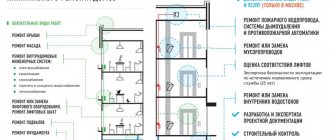Contribution for major repairs - Law
Since the end of 2012, a new expense item has appeared in utility bills: “Payments for major repairs.” Although many residents expressed dissatisfaction, payments began to be accrued monthly and were mandatory for payment, like others. The need is due to the fact that responsibility for the condition of owned residential premises rests with the residents. It turns out that when purchasing an apartment in an apartment building, a citizen also becomes a co-owner of the building, that is, basements, attics, roofing and other elements.
The costs for this item are significant. Therefore, they are stored in the account of the apartment building or transferred to the regional fund, in accordance with current legal acts.
Payment can be included in a single document or in a separate receipt
In letter No. 12315-ACh/04, the Ministry of Construction of the Russian Federation clearly indicated that an invoice for the payment of contributions for the overhaul of the common property of the owners in the house can be issued by the person/organization responsible for this in two ways: in a single payment document or in a separate receipt only for this type of service.
If a management organization or HOA is the owner of a special account, then when issuing payment documents for payment of fees, they must be guided by the decision of the owners made at the general meeting.
In accordance with Part 3.1 of Art. 175 of the Housing Code of the Russian Federation, when choosing a special account for the capital repair fund, the owners of the OSS must, among other things, determine the procedure for issuing payment documents and the amount of expenses associated with this.
That is, it is the owners who decide whether the payment for major repairs will be included in a single receipt for all services of the management organization, HOA or housing cooperative, or whether the owner of the special account must issue separate payment documents.
In the latter case, the costs for generating and printing invoices will fall on the shoulders of the owners. They will have to determine the source of funding for these works and the amount. Therefore, most often, residents of the house vote for the inclusion of an additional line in existing receipts for housing and communal services.
Is it possible to place money for major repairs in the account of a management company or homeowners association?
2163811
Categories of beneficiaries 2021
Beneficiaries are divided into 2 categories of citizens. Some are completely exempt from the need to deposit money, while others are only half exempt.
Elderly people - owners who have reached eighty years of age, living alone or in a family that consists only of pensioners - have a 100% benefit. However, if people of working age also live in the premises, the benefit does not apply to the pensioner.
The following persons may be exempt from paying contributions by fifty percent:
- Owners who have reached the age of seventy, who are no longer working and live alone or in a family consisting of persons who are also non-working pensioners.
- Families raising disabled children.
- Owners of residential premises who are parents of many children.
- Disabled people of groups 1 and 2.
- Veterans and participants of the Second World War, persons who were rehabilitated.
- Citizens who have been exposed to radiation.
- Low-income citizens if payments for housing and communal services and major repairs are higher than the share of income established in a particular region of residence.
- Persons who received the medal “For the Defense of the Mountains. Moscow" (the subsidy applies only to residents of the capital).
These are the main categories of beneficiaries living in multi-storey buildings. But local authorities have the right to include in the list other persons to whom the subsidy will apply in the relevant region.
Regions rich and poor
For different subjects of the Russian Federation, subsidies will be very different - depending on the size of the population, its age structure, and the minimum contribution for major repairs. RF PP N 92 introduces a maximum level of co-financing for each region for 2021, that is, that “ceiling” above which money from the federal budget will not be provided.
The lowest level of co-financing is provided for:
- Moscow – 5%,
- Yamalo-Nenets Autonomous Okrug – 10%,
- Tyumen region - 14%,
- Khanty-Mansiysk Autonomous Okrug - 19%,
- St. Petersburg – 23%.
Only two regions can count on 100% state support - the Republic of Crimea and the city of Sevastopol. This is followed by a number of subjects with a maximum level of co-financing of 95%: the republics of Altai, Dagestan, Ingushetia, Karachay-Cherkessia, Chechnya, Tyva, as well as the Kamchatka Territory.
Four steps of the Civil Housing Inspectorate when entering a house into the register of licenses at the request of the MA
38513
Who else and in what cases may not pay for repairs?
Attention! As stated above, major repairs are carried out at the expense of the homeowners. Therefore, if the premises are not privatized, the municipality is considered the owner. The tenant (under the social tenancy agreement) does not have to make the corresponding payment. There is no obligation for other tenants of housing (under a commercial lease agreement). The owners should do this for them.
Article 169 of the Housing Code of the Russian Federation provides for two more cases in which deductions for housing repairs are not made. These include situations:
- If there is a dilapidated house that should be demolished soon.
- If the land under the building is withdrawn for the needs of the state or municipality.
In these situations, the question of overhaul is no longer raised. Therefore, no deductions are made.
According to Article 170 of the Housing Code of the Russian Federation, if the minimum amount provided by law for the capital repair fund of apartment buildings is reached, the owners have the right to suspend the corresponding financing. Then payment will be collected only from those residents who are in arrears for this payment.
If the building is not included in the modernization program, the item is also not paid. Once a new home is enrolled in this program, payments must be made no later than five years. If the house is not a new building, then the corresponding obligation arises after eight months.
What work is included in the list of regional overhaul programs:
- repair of common premises and equipment - basements, attics, roofs, elevators;
- renovation of facades;
- foundation restoration;
- reconstruction of utility systems - sewerage, water supply, heating and lighting.
The minimum payment amount is calculated based on the norm for 1 sq.m. housing and is determined by local legislation. According to the homeowners, it can be increased (if they wish to speed up the collection of the necessary funds). Residents who ignore their obligation to pay contributions to the FKR risk eventually receiving a court notice to pay the debt and penalties accrued on it.
The Housing Code identifies several categories of housing, the owners of which are exempt from this additional burden:
- houses that are municipally owned - the responsibility for carrying out major repairs in this situation falls on the municipal owner;
- dilapidated houses - even if the residents paid contributions to the FKR, from the moment the act on the unsuitability of the building for habitation is drawn up, they are released from this obligation, and the funds they contributed must be returned;
- houses, the land under which is subject to seizure for municipal needs.
Do residents of new buildings ? Legislation allows new residents not to contribute to the FCR for a certain period of time. The exact period is determined by local authorities - as a rule, it does not exceed five years. However, the opposite is not prohibited: members of the HOA can voluntarily accumulate funds for future repairs in their special account with the regional operator.
For those who want to know how to legally avoid paying for major repairs, the instructions in the next section will help determine whether you are entitled to a benefit.
How to get a benefit - step-by-step instructions
As with receiving benefits for housing and communal services, in order to take advantage of the subsidy for repairs, which the owner of the premises has the right to legally count on, you must contact the municipal subsidy department. How registration is carried out is stated in Article 159 of the RF Housing Code, as well as in RF PP No. 761.
When calculating, the following points are taken into account:
- Relaxations are provided to citizens if they have no debt to pay taxes, utility bills, or repairs themselves. Therefore, if there is a debt, it must first be paid.
- You should find out whether the residential building is included in the region's program. This information is provided by the capital repair fund or the management organization.
- You need to obtain documents confirming your right to benefits from the social security office at your place of registration or from the MFC.
After this, the required package of documents is collected, in particular:
- Identity cards of apartment owners and family members.
- Documents that confirm membership of specific beneficiaries, for example, ID of a pensioner, veteran, etc.
- Receipts that confirm payment for repairs and services.
- Certificates of income of the applicant and family members.
- Extract from the house register.
- Statement. This document requires you to indicate the account. It will receive a subsidy.
Keep in mind! If you do not provide any of the above documents, you will not be able to obtain the benefit.
Responsibilities of the regions
As soon as the subjects of the Federation receive subsidies from the federal treasury, they have an obligation to spend them properly, and to return unspent funds. How this will be done is regulated by an agreement that will be concluded between the Ministry of Construction of the Russian Federation and the subject of the Federation (clause 9 of RF PP No. 92).
This agreement must include, among other things:
- amount of subsidy for major repairs ,
- procedure, conditions and terms for transferring and spending subsidies,
- procedure for monitoring the implementation of the agreement;
- deadlines and procedure for submitting reports on the use of subsidies;
- planned indicators for the use of the subsidy;
- consequences in case of failure to fulfill the plan;
- schedule for transferring subsidies, the procedure for changing it, as well as monitoring its implementation;
- liability of the parties for violation of the terms of the agreement.
If a subject of the Federation has not fulfilled its obligations under the previous agreement, then it will not be able to conclude a new agreement (except in cases where the reason for this was force majeure).
How public housing control will be carried out is described in this article.
Compensation for major repairs – who is entitled to it and how to get it
Returning to the question of those citizens who may not pay for major repairs, it should be said that benefits for them can be both state and regional. If a benefit is allocated at the state level, then it applies to persons specified in the Federal Law (namely, in the Housing Code of the Russian Federation). If a benefit is allocated at the regional level, then it is provided for by the law of the corresponding subject of the federation, and is valid only there.
Information about this is clarified from the housing department or the social security authority. Examples of federal beneficiaries are disabled children, and regional ones are large and low-income families.
Regardless of whether the owner of the premises must pay for repairs or was exempted from this payment (in whole or in part), he is obliged to make payment. After this, the subsidy is credited monthly to the account of the beneficiary indicated in the application upon appropriate registration. This is done no later than the 26th of each month.
If a citizen is a beneficiary for several reasons at once, he can use only one of his choice. Usually the most advantageous benefit is chosen.
If a citizen owns several real estate properties for which major repairs need to be paid, then the subsidy is paid only for one premises, at the choice of the beneficiary.
How is the benefit assigned?
The general rule is this: compensation for contributions for major repairs to pensioners and other beneficiaries is calculated based on the contribution per one square meter of total housing area per month, and it is determined by the regions.
This benefit is a refund of money paid on monthly receipts. If there are debts, payments are suspended.
If a citizen returns to work, the 50% compensation for capital repairs to pensioners over 70 years of age will no longer be paid. In addition, the benefit stops if a working relative is registered.
This measure of social support is not provided automatically, but upon application from the first day of the month following the month of application.
IMPORTANT!
In addition to the minimum contribution, local authorities also set a standard for the standard area of housing, and if the apartment is large, then even 100 percent compensation for major repairs for pensioners over 80 years of age will not cover the entire payment.
What happens if you don't pay
If a citizen is not a beneficiary, he has to pay the appropriate fee in full. Despite the desire, you should not ignore this payment, as a debt will form, which, sooner or later, will still have to be repaid. Not only that, as mentioned above, beneficiaries also pay for repairs. But then they will get their money back by transferring it to their personal account. If they do not make the appropriate payments for at least two months, the subsidies are suspended and the debtor is notified of the period during which the money must be paid. If payment is made, the benefit continues to apply.
For other citizens, the following situation occurs. For the resulting debt, a penalty is charged, the amount of which is 1/300 of the refinancing rate of the Central Bank of the Russian Federation for the overdue day (as stated in Article 255 of the Housing Code of the Russian Federation). If a significant amount of debt accumulates, the organization that is involved in the formation of this account has the right to apply to the court with a statement of claim to collect the debt. Then deductions will be carried out by bailiffs, on the basis of a writ of execution (and for this they are endowed with many tools).
Some citizens believe that after repair work has been carried out on the house, there is no longer a need to pay the corresponding fee. But in practice this is not the case. Often, credit funds are used to carry out these works, and repairs are done on credit. Therefore, the obligation to pay remains even if the house is renovated. But if the residents have completed the main repairs themselves, then it is possible to cancel this payment for a certain period or at least reduce it.
Is it worth paying or not?
It’s worth it if you don’t want trouble, first of all (because only the fear of punishment can force many citizens to comply with the established rules).
And secondly , it’s worth it if you want to live in a house suitable for living - after all, all tranches are strictly taken into account and house repairs are carried out at their expense.
This means that citizens pay not to the Management Company, but to themselves.
Conclusion
Major repairs must be paid every month. Even those who are exempt (fully or partially) from paying for major repairs must make this payment. But he gets his money back. If residents who are not beneficiaries ignore the corresponding expense column, a penalty will be charged. Therefore, they will have to pay even more later.
In some cases, the law allows for the possibility of not making this payment. Then we are not talking about specific citizens who are beneficiaries. This expense item may be absent, for example, due to a building that is in disrepair, or the land under the house being seized for the needs of the state or municipality.
No down payment and no payment after the first down payment: is there a difference?
Contributions are preliminary ; work will be carried out when the required amount has accumulated in the account. The HOA can take this process completely into its own hands and open its own account.
True, there is one “but” - if the deadline approaches, and it turns out that there are no funds, the owners will have to take out a loan from the bank.
Are we obligated to pay for major home repairs if there is no contract? There is also an opinion: if the contract has not been signed and the first payment has not been made (this is the effective confirmation of the party about the existence of a contractual relationship), then there is no need to pay.
In this case, they refer to Article 425 of the Civil Code, which regulates the adoption of the agreement.
I would like it that way, but in reality everything again comes down to the notorious Federal Law No. 271-FZ and Article 169 of the Housing Code.
It is they, and not the contract, who dictate to apartment owners whether to pay or not . The need for payment is clearly stated in the regulations.
After the adoption of the law, eight months are allotted for apartment owners to decide at a general meeting to whom they will transfer the contributions - to the regional operator or to a special account for their building.
Because it is the general meeting of owners that is the governing body of the house (Article 44 of the Housing Code), but it is not the final authority.
If a decision is not made, no problem - a regional account already exists and was kindly provided by the municipality.
Is it necessary to pay for major repairs? As you can see, the question “is it possible not to pay” is not worth it at all - the law obliges us to pay for repairs . The choice is “where to transfer contributions” - and here the owners are given a certain freedom of action.
Is payment required?
Many people ask: “Why should I pay for major renovations of an apartment building?” This is stipulated in Federal Law No. 271-FZ, adopted in 2012.
Also, the Housing Code requires owners to pay a contribution for repairs along with utility bills (we tell you how legal it is to demand payment for major repairs in receipts for utility bills here). Funds are transferred either to the Regional Operator's account or to a special dedicated account for a specific home.
This issue is resolved at a meeting of homeowners after the overhaul program has been adopted (read what it includes and how it is implemented in a separate article). If within a month you still haven’t decided, the first option is considered selected by default. That is, trust in the Regional Operator.
If the owners make a choice in favor of the second, then they are obliged not only to choose the bank themselves, but also:
- appoint an account owner;
- insurance;
- defining a list of works;
- budgeting;
- searching for a contractor;
- control over the execution of work and their acceptance;
- reporting.
Some citizens, having carefully read one article of the Housing Code - namely, 178 - and seeing the word “fund” in relation to the regional operator (which is the recipient), remember non-profit organizations (Law on Non-Profit Organizations, Articles 7 and 26), where payments can be made only voluntary, as well as the absence of an agreement (we will talk in more detail about whether there are options to legally avoid paying for major repairs in situations where an agreement with the Regional Operator has not been concluded in a separate publication, and more information about what the funds are overhaul, from what and how they are formed, you will find here).
However, the fixed nature of payments in housing complexes means they are mandatory. As well as the fact that in order to carry out the will of the state, you do not need to sign an agreement, as in the service sector, for which you can pay if you need them, or you can not pay. The requirements of the state are precisely requirements that can only be fulfilled.
No one says, when getting behind the wheel, that now he must sign an agreement in order to comply with the Traffic Rules, otherwise he can behave on the road as he pleases, and the inspector will not be able to fine him. So the question is: “Why should we pay for major repairs and maintenance?” - is inappropriate here.
The amount of the contribution varies depending on the region (Article 156 of the Housing Code). Also, when establishing a tranche, the age of the building and whether it has an elevator, and if so, in what condition, also matter - the condition of the balconies, etc.
More information about major repairs, including whether you can avoid paying for them, can be found here.
Why do we pay for major repairs?
Because this is the law - firstly, and secondly, nothing lasts forever, including buildings. They deteriorate, wear out, the performance of engineering systems deteriorates, elevators break down and become dangerous. Gradually the house becomes unsuitable and even dangerous for living.
Why are fees for major repairs and maintenance of the premises paid at the same time? Because this is a mandatory payment , the same as for all housing and communal services, for which the Management Company is responsible for collecting. We think that now you understand why you need to pay for major repairs?
Is it possible not to pay?
Are there cases in which for some reason you don’t have to pay for major repairs? Yes. In cases provided by law, namely:
- the house is recognized as unsafe;
- the building has been seized by authorities;
- you are not the owner of the home (for example, you live under a social tenancy agreement. In this case, the burden of taking care of money for repairs falls on the state (Article 65 of the Housing Code; Article 681 of the Civil Code));
- if the fee for major repairs is unreasonably high and you have proven this in court. True, the latter does not mean that you will not have to pay for it at all - you can only ignore the initial, inflated cost.
Read about whether owners of apartments in new buildings fall into the category of people who may not pay for major repairs here.
Moreover, compensation for major repairs is provided for those categories for whom this burden of maintaining a home may become unbearable simply due to age and position.
The state compensates the costs incurred in full to citizens whose age has passed the 80 mark (Article 169 of the Housing Code).
Compensation refers to the amount of money that the state is ready to pay to people with financial problems in order to make up for the expenses they have incurred on repairs. To apply for a benefit, you need to contact the social protection authority and provide, among other things, documents confirming the right to payment, as well as receipts for payment for major repairs.
50% compensation is due:
- single pensioners;
- people with disabilities, families with disabled children;
- persons over seventy years of age;
- large families.
Information: in some regions, rural state-funded teachers can also count on benefits
Is it possible to legally avoid paying for major repairs? Watch the video below:
We also describe in detail in this material how mandatory contributions for major repairs are for everyone and who may not pay them.










